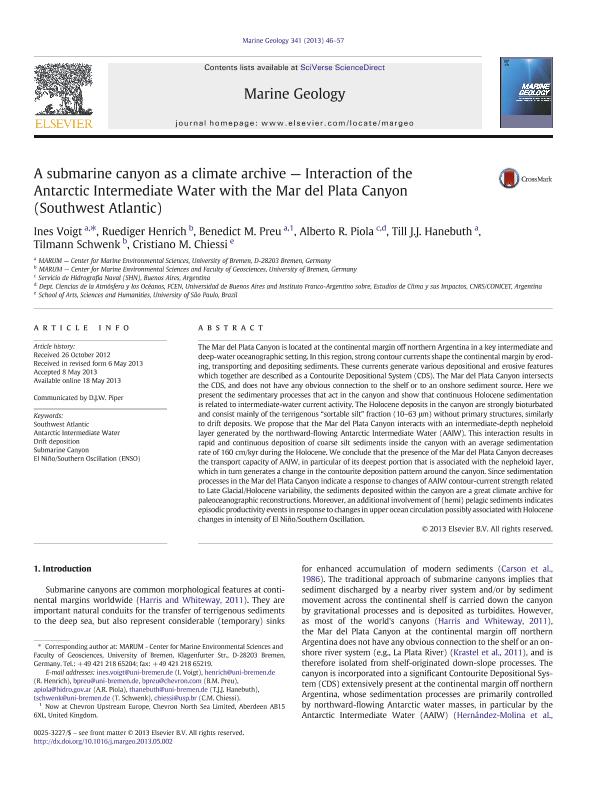Mostrar el registro sencillo del ítem
dc.contributor.author
Voigt, Ines
dc.contributor.author
Heinrich, Ruediger
dc.contributor.author
Preu, Benedict M.
dc.contributor.author
Piola, Alberto Ricardo

dc.contributor.author
Hanebuth, Till J. J.
dc.contributor.author
Schwenk, Tilmann
dc.contributor.author
Chiessi, Cristiano M.
dc.date.available
2017-09-13T19:14:37Z
dc.date.issued
2013-05
dc.identifier.citation
Voigt, Ines; Heinrich, Ruediger; Preu, Benedict M.; Piola, Alberto Ricardo; Hanebuth, Till J. J.; et al.; A submarine canyon as a climate archive — Interaction of the Antarctic Intermediate Water with the Mar del Plata Canyon (Southwest Atlantic); Elsevier; Marine Geology; 341; 5-2013; 46-57
dc.identifier.issn
0025-3227
dc.identifier.uri
http://hdl.handle.net/11336/24168
dc.description.abstract
The Mar del Plata Canyon is located at the continental margin off northern Argentina in a key intermediate and deep-water oceanographic setting. In this region, strong contour currents shape the continental margin by eroding, transporting and depositing sediments. These currents generate various depositional and erosive features which together are described as a Contourite Depositional System (CDS). The Mar del Plata Canyon intersects the CDS, and does not have any obvious connection to the shelf or to an onshore sediment source. Here we present the sedimentary processes that act in the canyon and show that continuous Holocene sedimentation is related to intermediate-water current activity. The Holocene deposits in the canyon are strongly bioturbated and consist mainly of the terrigenous ?sortable silt? fraction (10?63 μm) without primary structures, similarly to drift deposits. We propose that the Mar del Plata Canyon interacts with an intermediate-depth nepheloid layer generated by the northward-flowing Antarctic Intermediate Water (AAIW). This interaction results in rapid and continuous deposition of coarse silt sediments inside the canyon with an average sedimentation rate of 160 cm/kyr during the Holocene. We conclude that the presence of the Mar del Plata Canyon decreases the transport capacity of AAIW, in particular of its deepest portion that is associated with the nepheloid layer, which in turn generates a change in the contourite deposition pattern around the canyon. Since sedimentation processes in the Mar del Plata Canyon indicate a response to changes of AAIW contour-current strength related to Late Glacial/Holocene variability, the sediments deposited within the canyon are a great climate archive for paleoceanographic reconstructions. Moreover, an additional involvement of (hemi) pelagic sediments indicate episodic productivity events in response to changes in upper ocean circulation possibly associated with Holocene changes in intensity of El Niño/Southern Oscillation.
dc.format
application/pdf
dc.language.iso
eng
dc.publisher
Elsevier

dc.rights
info:eu-repo/semantics/openAccess
dc.rights.uri
https://creativecommons.org/licenses/by-nc-sa/2.5/ar/
dc.subject
Southwest Atlantic
dc.subject
Antarctic Intermediate Water
dc.subject
Drift Deposition
dc.subject
Submarine Canyon
dc.subject
El Niño /Southern Oscillation (Enso)
dc.subject.classification
Oceanografía, Hidrología, Recursos Hídricos

dc.subject.classification
Ciencias de la Tierra y relacionadas con el Medio Ambiente

dc.subject.classification
CIENCIAS NATURALES Y EXACTAS

dc.title
A submarine canyon as a climate archive — Interaction of the Antarctic Intermediate Water with the Mar del Plata Canyon (Southwest Atlantic)
dc.type
info:eu-repo/semantics/article
dc.type
info:ar-repo/semantics/artículo
dc.type
info:eu-repo/semantics/publishedVersion
dc.date.updated
2017-09-12T16:29:32Z
dc.journal.volume
341
dc.journal.pagination
46-57
dc.journal.pais
Países Bajos

dc.journal.ciudad
Ámsterdam
dc.description.fil
Fil: Voigt, Ines. Universitat Bremen; Alemania
dc.description.fil
Fil: Heinrich, Ruediger. Universitat Bremen; Alemania
dc.description.fil
Fil: Preu, Benedict M.. Universitat Bremen; Alemania
dc.description.fil
Fil: Piola, Alberto Ricardo. Ministerio de Defensa. Armada Argentina. Servicio de Hidrografía Naval; Argentina. Universidad de Buenos Aires. Facultad de Ciencias Exactas y Naturales. Departamento de Ciencias de la Atmósfera y los Océanos; Argentina. Consejo Nacional de Investigaciones Científicas y Técnicas; Argentina
dc.description.fil
Fil: Hanebuth, Till J. J.. Universitat Bremen; Alemania
dc.description.fil
Fil: Schwenk, Tilmann. Universitat Bremen; Alemania
dc.description.fil
Fil: Chiessi, Cristiano M.. Universidade de Sao Paulo; Brasil
dc.journal.title
Marine Geology

dc.relation.alternativeid
info:eu-repo/semantics/altIdentifier/url/http://www.sciencedirect.com/science/article/pii/S0025322713000777
dc.relation.alternativeid
info:eu-repo/semantics/altIdentifier/doi/http://dx.doi.org/10.1016/j.margeo.2013.05.002
Archivos asociados
